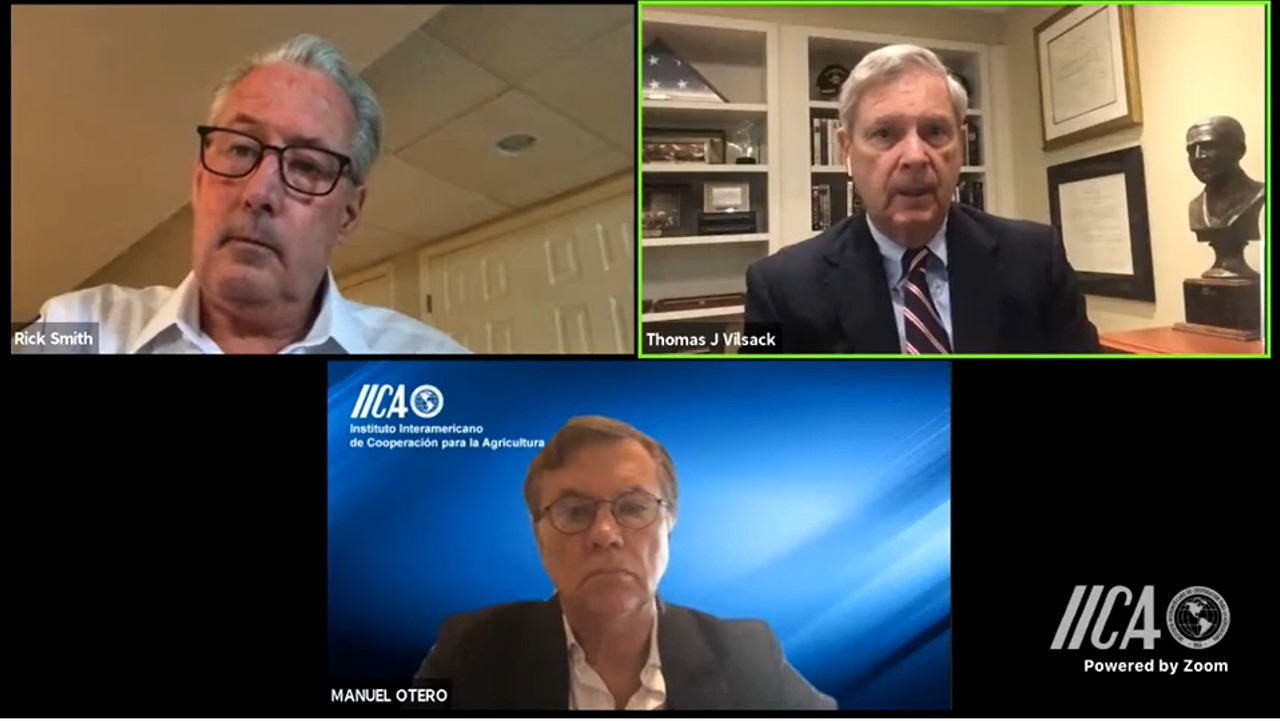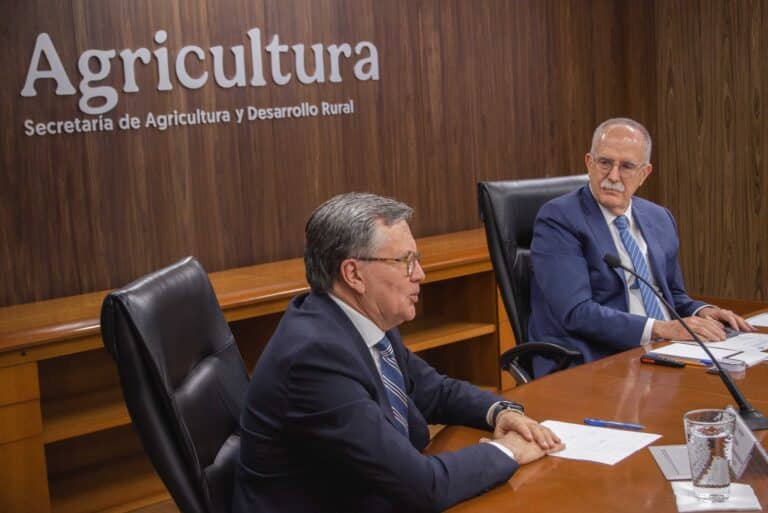Tom Vilsack, former United States Secretary of Agriculture; Rick Smith, Chairman of the Global Dairy Platform; and Manuel Otero, Director General of IICA, underscored the role of the industry in ensuring safe food, nutrition and the socio-economic development of the hemisphere.

San Jose, 28 August 2020 (IICA). Dairy products are essential to the global diet, given the health benefits they provide to people, which is a fact that the ongoing Covid-19 pandemic has made evident, and has made it even more necessary for actors in the sector to work together to bolster its sustainability and to create a more resilient food system.
Tom Vilsack, former United States Secretary of Agriculture and CEO of the U.S. Dairy Export Council (USDEC), stated that the hemisphere has already made progress in achieving this objective, indicating that, “In the last 15 years, the U.S. has been able to produce a gallon of milk using 30% less water and 20% less land, while reducing greenhouse gas emissions by 19%”.
In a webinar organized by the Inter-American Institute for Cooperation on Agriculture (IICA), the Global Dairy Platform (GDP) and USDEC, participants analyzed the fundamental role of dairy products in global socioeconomic development and the progress in achieving more responsible and sustainable development.
The discussion was led by Vilsack; Rick Smith, the Chairman of the GDP Board and President and CEO of Dairy Farmers of America; and by Manuel Otero, Director General of IICA.
Vilsack emphasized that, “This initiative is of vital importance in explaining to the world what the dairy industry is doing in terms of feeding people nutritiously and creating economic opportunities”.
The global dairy industry is comprised of one billion people. Smith indicated that, “600 million of these are working on dairy farms and the other 400 million are working elsewhere in the industry, whether in collecting the milk or in any other associated activity”.
“People have rediscovered the nutritional benefits, affordability and excellent taste of dairy products”, he added, “and we continue to improve our processes, to produce in an environmentally healthy and responsible way and are working hard to combat climate change. We have made great strides in reducing our global greenhouse gas emissions, although we still have a far way to go”.
Substantial contributions
In the seminar, it was explained that dairy products contain many under-consumed nutrients that are sources of high-quality proteins for the human diet.
It was shown that the consumption of dairy is linked to a lower risk for diseases such as Type 2 diabetes and hypertension; it improves the bone density of children and adolescents; provides cardiovascular and muscular benefits, while also boosting the immune system.
At the socioeconomic level, it was indicated that close to 800 million people living in rural areas depend on cattle rearing for their livelihood and that the livestock sector accounts for 46% of the agricultural GDP of Latin America.
Other benefits of the dairy industry are its impact on poverty reduction at the family and community level and its contribution to socioeconomic development and job creation.
Manuel Otero, Director General of the specialized hemispheric agency for agriculture and rural affairs, stated that, “IICA is collaborating to improve global knowledge and our understanding of the important role of dairy products for the economic, social, nutritional and environmental development of the Americas and the world. These products are essential for human nutrition and economic security”.
He went on to remark that science-based regulations are critical to protect the safety and health of consumers, as well as policies that foster technological improvement, while preserving the integrity of dairy products.
The matters addressed in the webinar will be compiled in an IICA publication, which will be presented at the proposed United Nations (UN) Summit of Food Systems, which will seek to increase public awareness and to establish commitments to transform these systems, in a bid to eradicate hunger and to reduce the incidence of nutritional deficiency diseases.
Other Global Dairy Platform representatives speaking at the webinar were Mitch Kanter, Technical Director; Brian Lindsay, Sector Lead for Sustainability and Secretary of the Dairy Sustainability Framework; and Ernesto Reyes, Sector Lead for Development.
The list of speakers also included Frank Mitloehner, Professor at the University of California, Davis; Emily Stepp, Vice-President of Farmers Assuring Responsible Management (FARM); and Jamie Jonker, Vice-President for Sustainability and Scientific Affairs of the National Milk Producers Federation (NMPF).
The event, the presentations and more information on the webinar are available here.
More information:
Horrys Friaca, International Specialist in IICA’s Agricultural Health and Food Safety Program (AHFS)
horrys.friaca@iica.int











